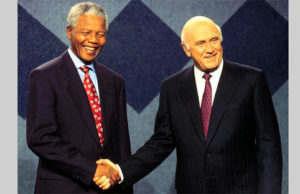Courage Is Not The Absence of Fear, Rather It The Triumph Over It.

Nelson Mandela is famously quoted as saying that courage is not the absence of fear but the triumph over fear. I found the quote relevant to the Brene Brown’s book, Dare to Lead and her emphasis on courage as key to leading successfully. I believe courage is the one competence that distinguishes great achievers and the average men and women and the research by Brene Brown is a confirmation. The one thing that seems so akin to men and women and which we cannot avoid is fear, yet its one of, if not the worst enemy of mankind. We have to master courage if we are to overcome fear and achieve our objectives in life which is essentially leadership. I say this to underscore that fact that courage is a key competence of leadership. Brown clearly shows that courage is about accepting or daring to be vulnerable and says:
“if you choose courage, you will absolutely know failure, disappointment, setback, even heartbreak. That’s why we call it courage. That’s why its so rare”
Brown states clearly that courage is a collection of four skill sets that can be taught, observed, and measured, which skills are: Rumbling with vulnerability, Living into our Values, Braving Trust and Learning to Rise. This serves to alienate courage as a core competence of leadership which can be learnt and measured. This an interesting aspect of the results of her research since courage has always been seen as an abstract attribute that cannot be measured and raised a lot of interest in her book and other of her books. It takes courage to achieve anything significant since we are faced with a lot of barriers and I believe that research is a great contribution to the area of developing leaders. I have no doubt as to the dire need of leaders in every sphere of life, and especially in my context in the developing world. It’s the lack of leadership and more so courage that informs the level of underdevelopment and its associated myriads of problems that abound in developing countries. I am so grateful that I get to be exposed to this kind of research work as I pursue my doctoral program.
It is so clear that courage can only be expressed in part by the degree of one’s willingness to be vulnerable and Brown states that our ability to be daring leaders will never be greater than our capacity for vulnerability, which for me is affirming of my experience in leadership. Taking any initiative in my leadership experience, elicits opposition from different quarters and one has to have the courage and readiness to overcome opposition. These barriers take the form of internal fears, doubts and hesitations, and external barriers of all kinds. When we ventured to start the ministry Missions of Hope International, back in 2000, that was one of our most lonely moments as all manner of opposition, accusations and outright condemnations confronted us. I realise that our capacity for vulnerability at that point was low but our readiness to face up to the challenge, helped to increase that capacity and this has helped me to be more courageous over the years. I treasure those opportunities when I have to master enough courage to be vulnerable as great growth opportunities for my leadership abilities. This particular book by Brown will definitely be added to my toolbox as I continue to develop more leaders in the work of ministry.
6 responses to “Courage Is Not The Absence of Fear, Rather It The Triumph Over It.”
Leave a Reply
You must be logged in to post a comment.
The courage to step out on a journey in spite of all the reasons not too is a highly underrated achievement in my opinion. Congrats to you on doing it so many years ago, and again now as you’re stepping out on another journey.
Thank you, Wallace, for the insight you have gained in your years in ministry. All of us in ministry rumble with vulnerability. It is good to know we are not alone. Thank you for the reminder to walk in courage.
Wallace,
Thank you for being courageous. Thank you for being brave. Thank you for being part of this cohort and challenging and inspiring all of us. Very good post!
It’s an interesting paradox Wallace that Brown suggests courage is a combination of values and vulnerability, yet courage is required prior to the excercise of values and vulnerability. I’m still trying to work out if courage stands alone? What do you think she is suggesting?
Thank you Digby, it’s indeed a paradox but I think they are all interrelated in that much as you need courage in the first place, your value system determines your level of courage in the first place. A person of high moral values is likely to have more courage in life and is likely to be more vulnerable than a person of low moral values.
Enjoyed your post, Wallace. Thanks for sharing the quote that “if you choose courage, you will absolutely know failure, disappointment, setback, even heartbreak. That’s why we call it courage. That’s why its so rare.” I agree that courage can lead to setbacks, but there is so much to learn from these failures. That’s what experience is all about! And I loved your quote from one of my faves, Nelson Mandela: “courage is not the absence of fear but the triumph over fear.” Nice post, Wallace!